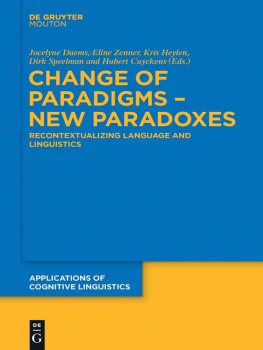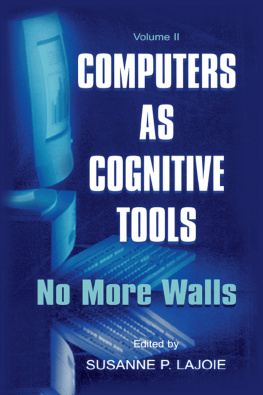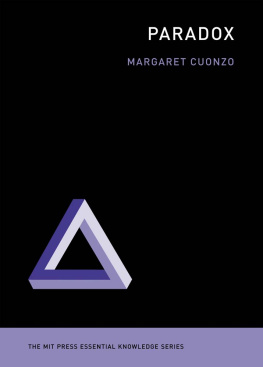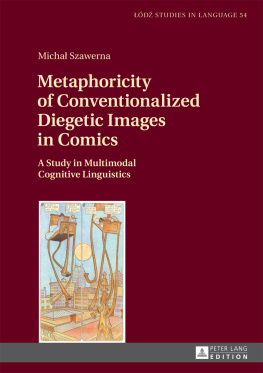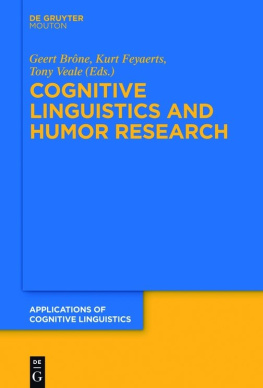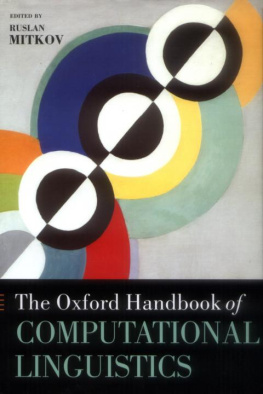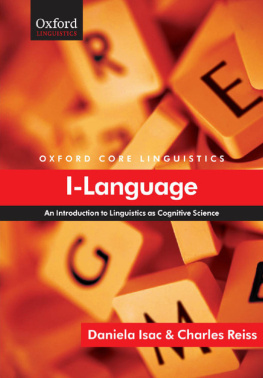- Eline Zenner, Gitte Kristiansen, Laura Janda, and Arie Verhagen?
Introduction. Change of paradigms - New paradoxes? - Jacob L. Mey?
Instru-mentality? - Marjolijn H. Verspoor?
The dynamics of a usage-based approach - Dylan Glynn?
Semasiology and onomasiology - Kathryn Allan
Education in the Historical Thesaurus of the Oxford English Dictionary - Ricardo Maldonado and Patricia Palacios
Bueno , a window opener? - Zoltn Kvecses
How does context produce metaphors? - Antonio Barcelona
Blending effects in bahuvrihi compounds? - Klaus-Uwe Panther?
Metonymic relationships among actuality, modality, evaluation, and emotion - Margaret E. Winters
On the origins of cognitive grammar - Fuyin Li, Mengmin Xu, and Alan Cienki?
The linguistic representations of agency in causal chains - John R. Taylor
Much in all as : The anatomy of a strange expression - Ronald W. Langacker
Descriptive and discursive organization in cognitive grammar - Ewa Dbrowska?
Language in the mind and in the community - Peter Harder?
Cognitive sociolinguistics, language systems and the fall of empires - Augusto Soares da Silva
Cultural cognitive models of language variation - Raphael Berthele
Googling Toubon - Dagmar Divjak
Four challenges for usage-based linguistics - Stefan Th. Gries
The role of quantitative methods in cognitive linguistics - Hans-Jrg Schmid
Does gender-related variation still have an effect, even when topic and (almost) everything else is controlled? - Benedikt Szmrecsanyi
Recontextualizing language complexity - Stefan Grondelaers and Dirk Speelman
A quantitative analysis of qualitative free response data
Jocelyne Daems, Eline Zenner, Kris Heylen,
Dirk Speelman and Hubert Cuyckens (Eds.)
Change of Paradigms - New Paradoxes
Applications of Cognitive Linguistics
Editors
Gitte Kristiansen
Francisco J. Ruiz de Mendoza Ibez
Honorary editor
Ren Dirven
Volume 31

ISBN 978-3-11-044134-5
e-ISBN (PDF) 978-3-11-043559-7
e-ISBN (EPUB) 978-3-11-043336-4
ISSN 1861-4078
Library of Congress Cataloging-in-Publication Data
A CIP catalog record for this book has been applied for at the Library of Congress.
Bibliographic information published by the Deutsche Nationalbibliothek
The Deutsche Nationalbibliothek lists this publication in the Deutsche Nationalbibliografie; detailed bibliographic data are available on the Internet at http://dnb.dnb.de .
Walter de Gruyter GmbH, Berlin/Boston
www.degruyter.com
To Dirk
Table of contents
Eline Zenner, Gitte Kristiansen, Laura Janda, and Arie Verhagen?
Introduction. Change of paradigms - New paradoxes?
Jacob L. Mey?
Instru-mentality?
Marjolijn H. Verspoor?
The dynamics of a usage-based approach
Dylan Glynn?
Semasiology and onomasiology
Kathryn Allan
Education in the Historical Thesaurus of the Oxford English Dictionary
Ricardo Maldonado and Patricia Palacios
Bueno , a window opener?
Zoltn Kvecses
How does context produce metaphors?
Antonio Barcelona
Blending effects in bahuvrihi compounds?
Klaus-Uwe Panther?
Metonymic relationships among actuality, modality, evaluation, and emotion
Margaret E. Winters
On the origins of cognitive grammar
Fuyin Li, Mengmin Xu, and Alan Cienki?
The linguistic representations of agency in causal chains
John R. Taylor
Much in all as : The anatomy of a strange expression
Ronald W. Langacker
Descriptive and discursive organization in cognitive grammar
Ewa Dbrowska?
Language in the mind and in the community
Peter Harder?
Cognitive sociolinguistics, language systems and the fall of empires
Augusto Soares da Silva
Cultural cognitive models of language variation
Raphael Berthele
Googling Toubon
Dagmar Divjak
Four challenges for usage-based linguistics
Stefan Th. Gries
The role of quantitative methods in cognitive linguistics
Hans-Jrg Schmid
Does gender-related variation still have an effect, even when topic and (almost) everything else is controlled?
Benedikt Szmrecsanyi
Recontextualizing language complexity
Stefan Grondelaers and Dirk Speelman
A quantitative analysis of qualitative free response data
Introduction.
Change of paradigms New paradoxes. Recontextualizing language and linguistics
The title of this volume consists of two main parts, which are both linked to the seminal work produced by Dirk Geeraerts in the course of the last 30 years. The first part, Change of paradigms: New paradoxes , is meant as a pun on the title of Dirks PhD thesis, Paradigm and paradox: Explorations into a paradigmatic theory of meaning and its epistemological background ( 1985) . To fully understand the contribution of this PhD, which already formulated key determinants of what would become the cognitive linguistics framework, three components of its title deserve some further clarification: (i) the basic idea behind phenomenological epistemology; (ii) the (polysemous) context-specific semantic load of the term paradigm; (iii) the nature of the construed paradox.
Phenomenological epistemology considers knowledge as the synthetic interaction between the cognitive activity of the knowing subject and the givenness of the object known (Geeraerts 1985: 13). In this respect, phenomenological epistemology can be contrasted with philosophical knowledge-theoretical views in which one of these two components either the thinking subject or the given object is seen as primarily responsible for knowledge (readers will recognize the basis of the age-old controversy between rationalism and empiricism, respectively, here). An additional and highly important component of Geeraertss epistemology holds that knowledge is stored in structures. This then of course raises the question how we should conceive of the nature of these structures.
This is where paradigmaticity comes in. Crucially, paradigmaticity should in the present context not be understood in opposition to syntagmaticity. In-stead, it is used in reference to the meaning of the Greek word ( paradeigma exemplar) and is as such meant to emphasize the idea that knowledge is organized in structural categories that are highly flexible and have peripheral nuances, with vague boundaries that are clustered around central, prototypical cores.
Additionally, Geeraerts relates paradigmaticity to Kuhns usage of the term as referring to a set of practices and beliefs that make up a scientific discipline at a given point in time: in his PhD, he aimed to set up a comprehensive theory of science and methodology in general and of the choice between paradigms in particular. Geeraertss claims on scientific paradigmaticity were construed through the rhetorical outline of the book, which starts from the level of linguistic knowledge, moves up to the level of general cognition and then arrives at the level of methodological meta-theory. It is at this final level that the notion of paradox fully comes to the fore. Specifically, it appears that applying the para-digmatic-phenomenological theory to the theory itself leads to a philosophical-epistemological paradox. When the theory is taken to hold universally, it follows that it is not universal, raising the question whether any scientific paradigm can ever be truly objective if the paradigmatic-phenomenological theory is said to hold.
Next page
